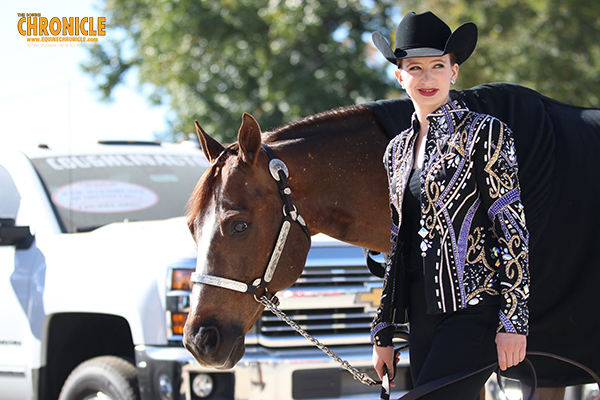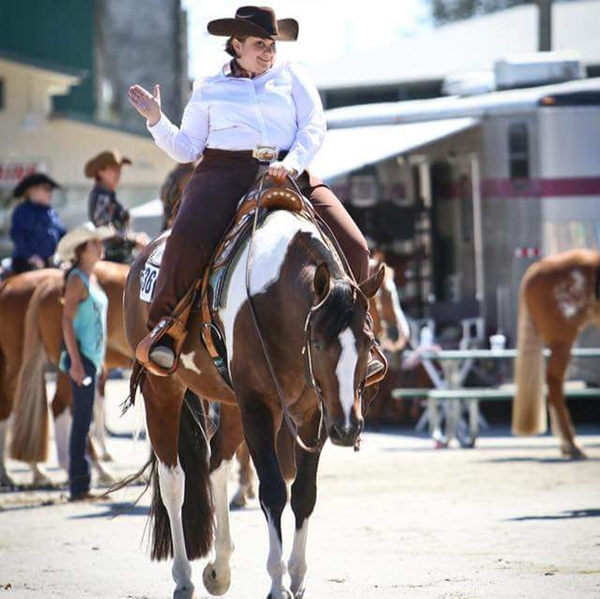Conquering the Equestrian’s Fear of Change- A Two Part Series
Humans fear change. In some cases, this is our single greatest fear. Every one of us has a deep need for a sense of control. Whether we’re aware of it or not, the fear of change is very deeply seeded in our biological senses. We seek a sense of control over what we do and how it impacts us.
As I sit and think about that fact, I also find myself reflecting on my life within competitive equestrian circles. I can’t help but think about myself and my friends who have moved on to new horses, new training programs, changed breed organizations, left the industry for various reasons, and who feel the industry has let them down in some way. The wheels of change are always moving, and those wheels require us to have steadfast courage and resilience.
Poet, Edgar A. Guest, wrote, “You’re the handicap you must face. You’re the one who must choose your place.” Now, Mr. Guest wasn’t a competitive equestrian; however, his words hold a great deal of truth to them for our industry. Clients, exhibitors, and owners are the handicaps that we must face. Today, I’m choosing to look closely at our fear of change and reflect upon how the principles of personal ownership and responsibility to, “us,” the competitive equestrian, can help us overcome and move forward, positively and respectfully.
There comes a moment for every competitive equestrian when you begin to reflect upon your program and ask yourself if it’s the right fit. Let’s face reality, my friends. Things happen to all of us: our goals change, we outgrow people, we outgrow our horses, and we crave higher or lower levels of competition. This very normal thing happens where our individual goals change over time. It’s not bad, and it doesn’t have to be something feared or repressed in any way.
We begin to really reflect and evaluate our performances and our horse’s performance. We reflect upon our trainers’ approach and measure our individual growth against our peers. We start to really think about if our wants, needs, and goals are attainable within our current program. This doesn’t have to be a bad thing, and it doesn’t immediately signal the end of a professional relationship with your current trainer or coach. This is called taking personal responsibility toward your own positive growth, or attaining a sense of control over your equestrian-related outcomes.
Neuroscience research explains that this moment of actualization registers in our brains like an error code. “Warning, Warning, Warning!” It prompts us to make a correction so that we can return to our comfort zone. It requires careful thought and respectful actions in order to return to our happy place of competence. But, what do I do? How do I respond to my error message? How do I overcome my fears?
There are multiple stakeholders involved, who ultimately want the same outcome- for you and your horse to achieve your goals. There are some things that all of us can do to ensure we’re engaging in professional, respectful, and open communication, so that we can move toward positive and lasting change, without fear. Realizing the need for change doesn’t equal a blame game.
#1- Talk with your trainer. Remember, this may be a hobby for you, but it’s a profession for your trainer. Before you decide things aren’t working, have you actually talked with your trainer and shared your perspective? Have you engaged in any type of goal setting? Has there been any type of discussion about your wants and needs? Have you asked questions about their processes or reasons why they do things the way they do?
#2- Think critically about yourself and what you’re currently bringing to the table. Are you honestly prepared for what is required of you to achieve your goals? Be real with yourself. Are you willing or able to do your part? Have you given 100% toward the outcomes you want, or have you only put in a small amount? Are you holding your trainer accountable for something that they did not set up for you?
#3- Is your horse supported in a way that will allow you to reach your goals? Do you engage in routine lessons? Is your horse in a full time training program? The outcomes you seek, may in fact be dependent upon the level of training commitment to you, your horse, and your trainer. It took me years to realize that I was un-training my own horse more than I was allowing my trainer to train him. For years, I kept my horse in a partial training program, which only allowed me a small amount of growth. It wasn’t until my life circumstances changed, and I had to keep my horse in a full time training program year round, that I was able to see the value and benefit to my own competition levels and outcomes. My dear friends, you see, I just didn’t know what I didn’t know. Have you considered this?
#4- Give your intervention some time. In my “other life” as a public school teacher, I’m constantly designing interventions for students and implementing them over a period of time to measure their effectiveness. The same is true for the world of competitive equestrians. If you have taken the proactive step to talk things out with your trainer, and collaboratively made a plan, give the plan some time before you decide it’s ineffective. Also, if you’re a new horse and rider team, it does take time for the relationship to build, and also with your trainer. Be mindful of that.
If, after all of this, you still feel that your current program isn’t a good fit for you, then look for a program that will fit your needs. We do sometimes outgrow our trainers or move up the competition ladder. Your trainer will understand and respect you for being a respectful and thoughtful communicator, who was a change embracer, versus someone who went behind their back. Remember, this is your hobby, but the trainer’s profession. This is a good time to apply the golden rule of treating people the same way you would like to be treated. If the roles were reversed, how would you like to be treated? In your own professional life, what are the rules or norms that you expect from others?
Our lives are filled with situations where uncomfortable, although potentially positive, conversations can change the entire course of a relationship. The same is true for the equestrian side of our lives. We should embrace our biological need for a sense of control and harness it toward a positive and respectful outcome, instead of burning bridges as we go. While our horse community may seem very large, it’s in fact smaller than we think.
My fellow competitive equestrian enthusiast, I ask that you evaluate your personal positions and address your personal error messages in a way that’s respectful and kind to others in our industry. Embrace the changes that you feel deep down are needed, and invest yourself in positive outcomes. I hope that each and every one of you has a long and fruitful ride through this amazing industry! I hope all your individual dreams and goals come true! I also hope you will think about this and be the respectful and collaborative embracer of change that we all have in us to be.
Respectfully Yours ~ Kory Kumar
If you’d like to write a blog about a topic in the equine industry, email B.Bevis@EquineChronicle.com for consideration.












